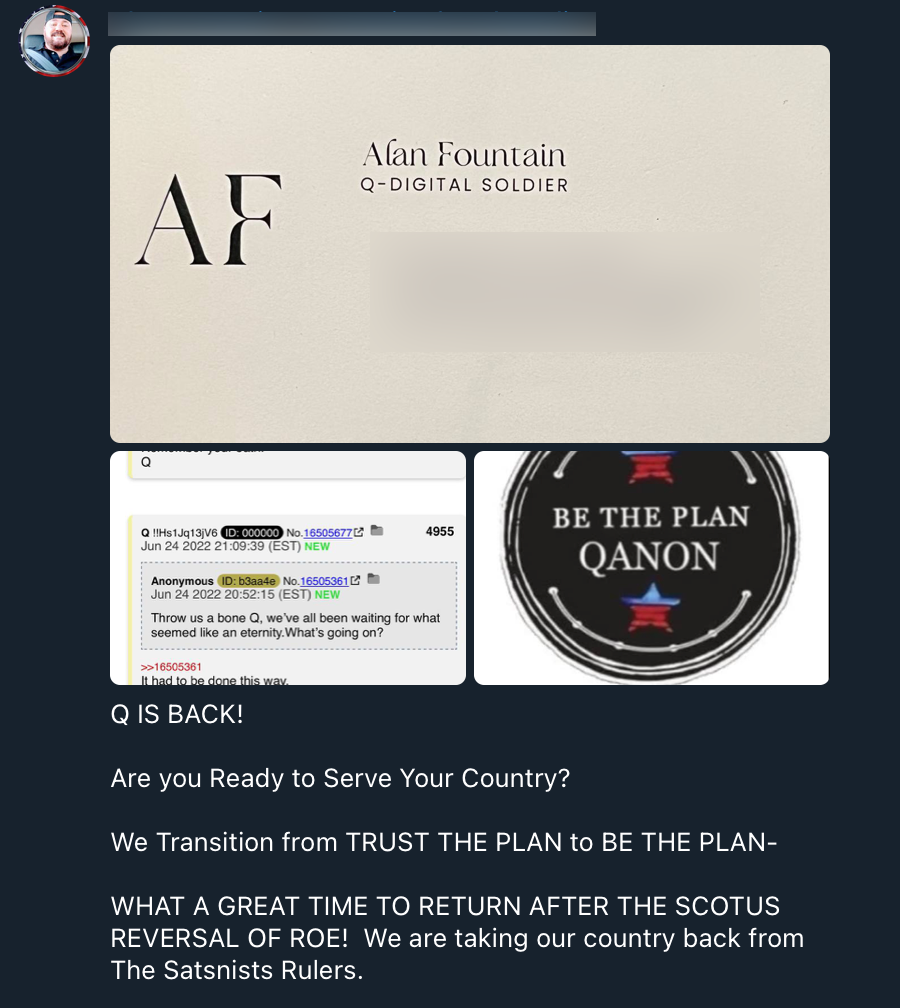QAnon community celebrates the return of “Q” after an 18-month absence
QAnon influencer: The return of Q could be a “laser pointer” for the 2022 midterm elections and the 2024 presidential election
Written by Alex Kaplan
Published
Supporters of the QAnon conspiracy theory are celebrating the first posts from “Q,” the conspiracy theory’s central figure, in more than 18 months, saying it has “re-energized” the movement and could serve as a “laser pointer” to focus fellow conspiracy theorists for upcoming elections.
The QAnon conspiracy theory, and Q, started on far-right message board site 4chan, later moving to fellow far-right message board site 8chan, which has since relaunched as 8kun. Some supporters of QAnon have been tied to violent incidents and participated in the January 6 insurrection at the United States Capitol, and the conspiracy theory has inspired internal warnings from multiple government agencies.
Following the 2020 presidential election, Q went silent, last posting on December 8, 2020. But on June 24, the same day the Supreme Court overturned Roe v. Wade, Q returned to 8kun, asking, “Shall we play a game once more?” and, “Are you ready to serve your country again? Remember your oath.” Q explained the lengthy silence by saying, “It had to be done this way,” and the following day, the account directly referenced the Supreme Court’s overturning of Roe.
QAnon supporters expressed euphoria over the posts. Some connected it to the Supreme Court decision overturning Roe, with one believer proclaiming, “Q comes back the same exact day that the deep state loses their main weapon used for human sacrifice,” adding, “You can't make this up.” Others described the June 24 reemergence of Q as “the best day anons have ever had” and an “Amazing Time to be alive” and said that they would possibly “faint” from excitement. Some supporters revived their so-called “Digital Soldier Oath” in response to Q’s call to “remember your oath,” which Q first urged supporters to take back in 2020.


Jim Watkins, the owner of 8kun and a QAnon supporter who previously said he hoped Q would return, also hyped Q’s reemergence, telling another influencer that the new posts look “legit” and saying of Q, “Welcome back. We need you.” (Jim’s son, Ron Watkins, a Republican congressional candidate in Arizona, has been speculated to have authored at least some of the Q posts.) Some who have previously shared support for QAnon expressed skepticism about the legitimacy of the new Q posts, such as Paul Furber — who may have written some of the previous Q posts — pointing to possible evidence of involvement from the Watkinses.
Meanwhile, some noted that the QAnon community at this point no longer needs Q, regardless of whether these are “real” Q posts. One QAnon influencer wrote that “it doesn’t matter to me whether the posts are legit or not,” adding, “We don't need to keep legitimatizing Q anymore. Q served their purpose and woke up so many.” Another wrote, “We Transition from TRUST THE PLAN to BE THE PLAN.”

On one show, hosted by QAnon influencer Jon Herold (known online as “Patel Patriot”), a group of QAnon influencers discussed the new Q posts and whether they were legitimate, while Herold argued that Q “triggered a movement” and “woke a ton of people up” before claiming that “its mission was completed.” Another influencer, Jordan Sather, responded to the new posts by saying that “as we head towards [the] midterms, as we head towards the next year or two and the next presidential election, we could definitely use that sort of laser pointer again.” Another influencer, Kate Buckley (known online as “Kate Awakening”), said that the new posts bring “a lot of excitement back” and that they could serve as “Q 2.0, where … it’s not important if you follow the Q drops, it’s the information that we got from it.” Craig Longley (known online as “IET”) shared that sentiment, saying of Q, “Having it come back, everyone's just kind of re-energized, which will be needed — right? — if it’s about to go down.”
Citation From the June 26, 2022, edition of Devolution Power Hour
And QAnon show host Zak Paine, who participated in the January 6 insurrection, expressed some skepticism about the legitimacy of the new posts and said, “I don’t think that it matters that they’re real or not” because “we’ve had 18 months without Q and in that time I really feel like we have matured as a movement. People have gotten directly involved in their local communities, they have turned away from looking every single day, waiting for a post, waiting for some message or some directive. And they’ve begun to do this stuff themselves.”
Citation From the June 27, 2022, edition of RedPill78
The QAnon conspiracy theory and its supporters have continued to play an extended role in American politics and society, even without Q. Numerous QAnon congressional candidates have run for and been elected to Congress and governorships, and the numbers continue to climb; a QAnon influencer is actively involved in a coalition to recruit and elect secretary of state candidates around the country; and a QAnon influencer is running an Arizona congressional campaign. The community has also focused heavily on local politics, such as school boards and Republican precinct committees, and given a boost to the election denier movement and to anti-vaxxers. And some of the tenets of the conspiracy theory — particularly the idea that their perceived political opponents are pedophilies — seem to have gained traction in more mainstream Republican politics.
So while the QAnon community had effectively moved beyond Q and remained influential, the return of the conspiracy theory’s central figure may give it a boost as it continues to cause harm.
